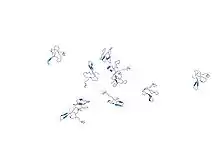Gurmarin
Gurmarin is a 35-residue polypeptide from the Asclepiad vine Gymnema sylvestre (Gurmar). It has been utilised as a pharmacological tool in the study of sweet-taste transduction because of its ability to selectively inhibit the neural response to sweet tastants in rats.[2] As a sweet-taste-suppressing protein, gurmarin is only active on rodent sweet taste receptors but not on that of humans. ref: Appl Microbiol Biotechnol. 2012 Nov;96(3):619-30
| Gurmarin | |||||||||
|---|---|---|---|---|---|---|---|---|---|
 Structure of gurmarin, a sweet taste-suppressing polypeptide.[1] | |||||||||
| Identifiers | |||||||||
| Symbol | Gurmarin | ||||||||
| Pfam | PF11410 | ||||||||
| InterPro | IPR010485 | ||||||||
| SCOP2 | 1gur / SCOPe / SUPFAM | ||||||||
| OPM superfamily | 112 | ||||||||
| OPM protein | 1c4e | ||||||||
| |||||||||
| Gurmarin | |||||||
|---|---|---|---|---|---|---|---|
| Identifiers | |||||||
| Organism | |||||||
| Symbol | ? | ||||||
| PDB | 1c4e | ||||||
| UniProt | P25810 | ||||||
| |||||||
References
- Arai K, Ishima R, Morikawa S, et al. (April 1995). "Three-dimensional structure of gurmarin, a sweet taste-suppressing polypeptide". J. Biomol. NMR. 5 (3): 297–305. doi:10.1007/BF00211756. PMID 7787425. S2CID 36794097.
- Arai K, Aimoto S, Morikawa S, Yoshimura S, Ishima R, Imoto T, Miyasaka A, Akasaka K (1995). "Three-dimensional structure of gurmarin, a sweet taste-suppressing polypeptide". J. Biomol. NMR. 5 (3): 297–305. doi:10.1007/BF00211756. PMID 7787425. S2CID 36794097.
This article is issued from Wikipedia. The text is licensed under Creative Commons - Attribution - Sharealike. Additional terms may apply for the media files.